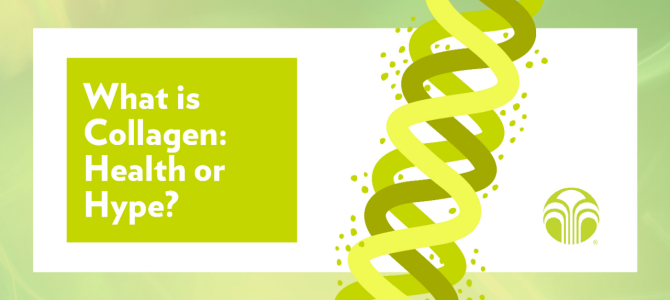What is collagen: Health or Hype?
August 18, 2021

What is collagen?
Collagen is incredibly important because it is the main protein found in our connective tissue. Connective tissues are what hold us together, creating the foundational structure and framework of our bodies. In fact, collagen composes about 70-80% of our skin’s dry weight1.
It is also the most abundant protein found in the human body, making up about 30% of all proteins in our bodies2.
Collagen Structure and Type
Like all proteins, collagen is made up of many amino acids connected into long chains or strands. Collagen has three of these chains that wind together to form a structure called a triple helix. There can be a lot of minor structural differences in this triple helix, meaning not all collagen is identical. Scientists have identified about 28 different types of collagen so far2.
The most abundant types of collagen in the body are collagen types I, II, and III. Collagen type I is the most common in skin, bone, tendons, and ligaments. Collagen type II is most common in cartilage. And collagen type III is usually found in skin and bone, alongside type I. The location, structure, specific amino acid composition, and function of different types of collagen all play a role in how it is classified and how it works in the body.
Function of Collagen Throughout the Body
Collagen is found throughout our bodies in a wide variety of different tissues, including muscles, tendons, ligaments, bones, heart, joints, and skin. Connective tissue is everywhere! That means collagen is too, and it plays a critical role in keeping our bodies functioning properly.
In muscles, tendons, and ligaments, collagen has the same basic function: it provides structure, strength, and some stretch to our tissues. In our bones, collagen has a similar role. It helps with bone strength by providing the scaffolding structure where minerals like calcium are deposited. Similarly, in the heart, collagen helps provide structure and strength so that our hearts can beat properly.
In our joints, collagen works a little bit differently. It covers the ends of our bones and helps them move against each other smoothly as we bend our joints. Imagine having your bones scrape together every time you moved a joint. Ouch!
The last example is one you probably are familiar with: the skin. In our skin, collagen provides a scaffolding structure and some stretch, which helps skin look smooth and healthy. It also helps heal our skin wounds. The skin is one of the easiest places to see the effects of not having enough collagen. As collagen in the skin breaks down, the skin loses its structural integrity, and wrinkles begin to form and deepen over time. Yikes!
See why collagen is so important?

Factors That Influence Collagen Production
Given the important role that collagen plays throughout the body, the next step is to understand what influences collagen production or causes it to break down. As we age, collagen production in our bodies gradually declines. In fact, our ability to replenish collagen naturally decreases by about 1.5% each year3. If that weren’t bad enough, aging is one of many factors that play a role in this decline. Lifestyle factors, such as pollution, smoking, oxidative stress, and our environment, all accelerate collagen loss4.
But it’s not all bad news. There are things we can do to support collagen production. Limiting our exposure to sunlight or other sources of oxidative stress is a great first step. Or when in the sun, we can use a quality sunscreen to protect our skin. Our diet matters, too. Getting enough vitamin C is important, since vitamin C is a cofactor for collagen production5. So, stocking up on foods like oranges, broccoli, and peppers is smart. Omega-3 fatty acids from fish, antioxidants naturally present in fruits and vegetables, and healthy sources of protein can all play a role in supporting collagen and skin health as well. And of course, you can supplement with collagen for additional support.
Where does collagen come from?
Collagen is present in virtually all vertebrate animals. Collagen that is used in dietary supplements often comes from one of these sources: cows (bovine collagen), pigs (porcine collagen), or fish (piscine collagen, often sourced from fish skin). Collagen is sometimes also derived from other sources like chicken cartilage. In short, collagen generally comes from bones or skin of animals, depending on the product and its intended use. Collagen is not found in plants, so there are, unfortunately, no vegan sources of collagen.

Benefits of Supplementing with Collagen
Taking a dietary supplement that contains collagen (especially collagen peptides) provides your body with the building blocks it needs to make more collagen. Some sources of collagen peptides have been studied for specific health benefits in targeted areas of the body, whether that’s skin, joints, tendons, or somewhere else, so you can pick one that is specific to your individual needs. And lastly, some sources of collagen peptides can actually stimulate your body to produce more collagen6.
Summary
Collagen plays an important role in our health and wellness, adding structure and strength to a wide range of different tissues throughout our body. By making healthy lifestyle choices like eating a balanced diet, limiting your sun exposure and other sources of oxidative stress, and even supplementing with additional nutrients, you can protect and support collagen inside your body.

Written by:
Rebecca Major
R&D Communication & Education Manager
Pharmanex
Sources:
- Oikarinen A. (1994). Aging of the skin connective tissue: how to measure the biochemical and mechanical properties of aging dermis. Photodermatology, photoimmunology & photomedicine, 10(2), 47–52.
- Ricard-Blum S. (2011). The collagen family. Cold Spring Harbor perspectives in biology, 3(1), a004978. https://doi.org/10.1101/cshperspect.a004978
- Sibilla S, et al. An Overview of the Beneficial Effects of Hydrolysed Collagen as a Nutraceutical on Skin Properties: Scientific Background and Clinical Studies. The Open Nutraceuticals Journal. 2015;8:29-42.
- Knuutinen A, Kokkonen N, Risteli J, Vähäkangas K, Kallioinen M, Salo T, Sorsa T, Oikarinen A. Smoking affects collagen synthesis and extracellular matrix turnover in human skin. Br J Dermatol. 2002 Apr;146(4):588-94.
- DePhillipo NN, Aman ZS, Kennedy MI, Begley JP, Moatshe G, LaPrade RF. Efficacy of Vitamin C Supplementation on Collagen Synthesis and Oxidative Stress After Musculoskeletal Injuries: A Systematic Review. Orthop J Sports Med. 2018 Oct 25;6(10):2325967118804544.
- Proksch E, Schunck M, Zague V, Segger D, Degwert J, Oesser S. Oral intake of specific bioactive collagen peptides reduces skin wrinkles and increases dermal matrix synthesis. Skin Pharmacol Physiol. 2014;27(3):113-9.
-
Many dermatologists agree that one of the most important things you can do for your skin is wear sunscreen. While essential for life, the sun releases different kinds of ultraviolet radiation, the most common being UVA and UVB. UVA rays have a wavelength between 320-400 nm and are known to contribute to photoaging and hyperpigmentation and may even contribute to skin cancer. UVB rays have a wavele...
-
Iron is a mineral that is naturally present in certain kinds of foods. For us humans, it is a critical component of hemoglobin, the protein in our blood that carries oxygen to the body’s tissues. It also plays an important role in growth and development, including both physical and neurological development.

